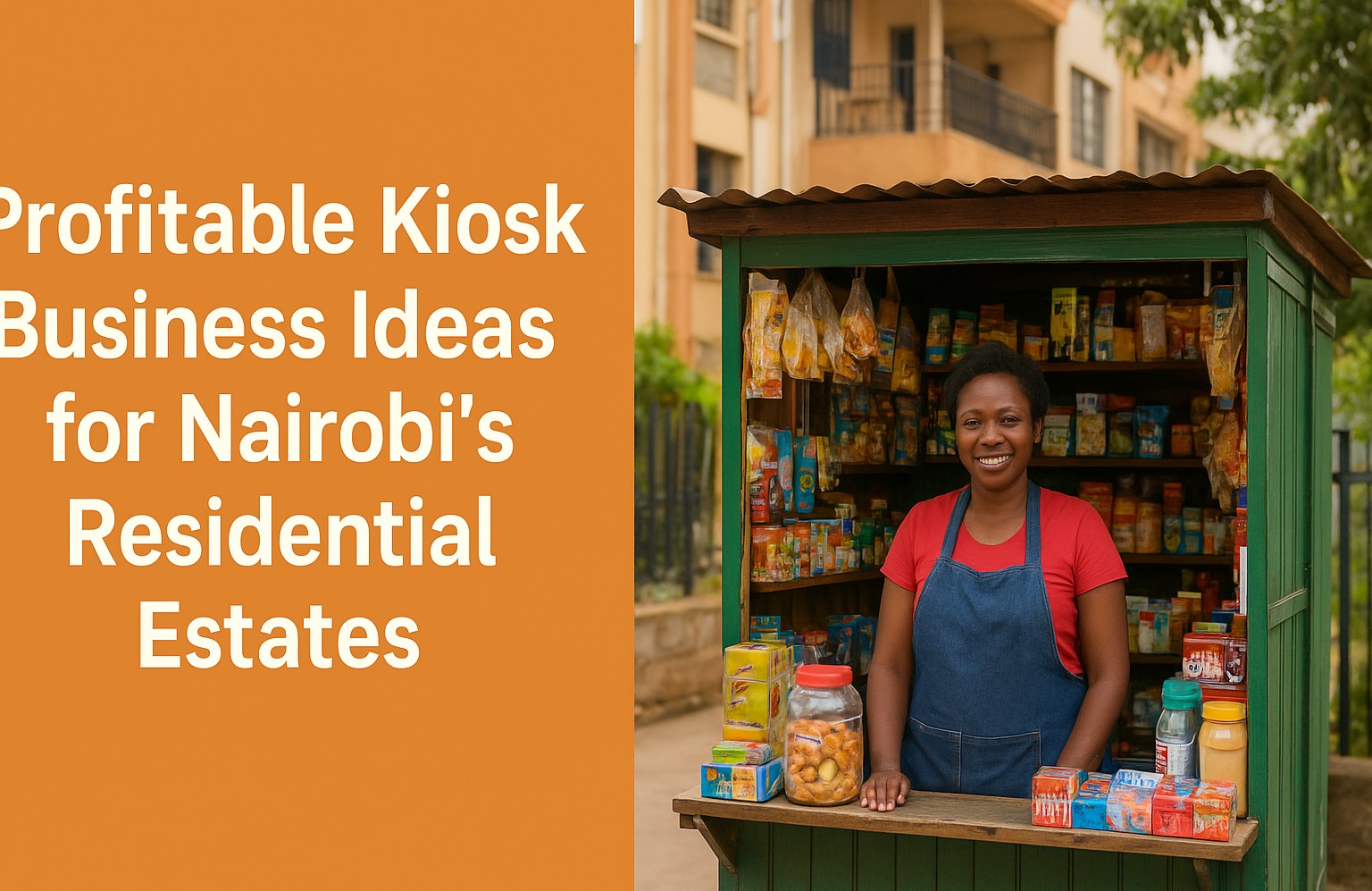

Titus Morebu
Author
Profitable Kiosk Business Ideas for Nairobi’s Residential Estates 💡
Discover high-return kiosk ideas suited to Nairobi estates. Learn startup tips, location insights & digital enhancements to build a sustainable, profitable mini-business.
In Nairobi’s bustling residential estates—Buruburu, Makadara, Lavington, Kilimani, and beyond—small kiosks remain one of the most accessible, high-impact ventures. With relatively low capital, flexible operations, and the right strategy, a kiosk in your estate can deliver steady profits every month. This guide will walk you through the top profitable kiosk types, how to set them up, maximize revenue, and future-proof your business for AI and digital trends. 🚀
Why Kiosks in Estates Are a Smart Bet
- Consistent foot traffic: Estates have daily consumer needs—snacks, charging, airtime, laundry, toiletries.
- Low overheads: You don’t need a large floor area or heavy staffing.
- Impulse and necessity buys: Many sales will come from urgent needs rather than planned shopping.
- Scalable and adaptable: You can start small and expand later or pivot product mix easily.
- Digital integration: With platforms like Kyosk, local kiosks can streamline ordering and supply. (expanding in Nairobi)
Top Profitable Kiosk Ideas for Nairobi Estates
Below are kiosk types that have high chances of success in estate settings. Tailor based on your specific location, customer demographics, and capital.
1. Grocery & Fast-Moving Consumer Goods (FMCG) Kiosk 🛒
This is one of the most tried-and-tested models. Stock essentials that families need daily.
- Staples: flour, sugar, rice, cooking oil, salt.
- Snacks & drinks: small packs of chips, soda, bottled water.
- Bread, milk, eggs, dairy items (if refrigeration is feasible).
- Household essentials: detergents, soaps, sanitary pads, candles.
- Seasonal items: umbrellas during rainy season, mosquito repellent in hot months.
Margins tend to be slim (often 5–15 %), so your volume and inventory turnover matter more than per-unit profit.
2. Food / Fresh Snacks Kiosk
People always need a quick bite. This kiosk can be hugely profitable when located near walkways, schools inside estates, or where people pass in the morning or evening.
- Local favorites: mandazi, samosas, fresh juice, boiled eggs, chapati rolls.
- Fast service is critical—items ready-to-go or minimal waiting.
- Maintain hygiene and food safety to build repeat customers.
- Consider offering combos (snack + drink) for value.
3. Mobile / Phone Services & Airtime / Data Kiosk
With smartphone penetration high, demand for top-ups, data bundles, SIM cards, and phone accessories (chargers, earphones) is constant.
- Integrate a mobile money / M-Pesa service window.
- Sell scratch cards, mobile bundles, eSIM top-ups if possible.
- Repair or basic accessory kiosk (screen protectors, cases) as upsell.
4. Laundry / Ironing / Clothes Care Kiosk
Many residents will prefer dropping laundry close to home rather than traveling far.
- Provide wash & fold, ironing, minor mending services.
- Offer small packaging (shirts, trousers) for quick turnaround.
- Pick-up and delivery within the estate can be a premium service.
5. Beauty / Personal Care / Salon Kiosk
Basic grooming services can work well, especially if you can serve men and women in mini-scale.
- Service mix: haircuts, shaving, kids’ hair, facial services, manicure.
- Sell consumables: hair products, creams, cosmetics, hair clips.
- Offer loyalty cards or discount bundles to residents.
6. Stationery / Printing / Photocopy Kiosk
This works especially if your estate has schools, students, or where many people work from home.
- Photocopying, scanning, lamination.
- Sell stationery: notebooks, pens, printer ink, envelopes.
- Offer design or small poster-printing as add-ons.
7. Cold Drinks & Ice Cream Kiosk
Refreshing products are popular in Nairobi’s heat, especially during afternoons and weekends.
- Chilled sodas, bottled water, juices, ice cream bars.
- Ensure refrigeration maintenance is reliable (power backup may be needed).
- Offer combos or chill packs during events in the estate.
8. Agro / Green Produce Kiosk
Fresh vegetables, herbs, or mini salad packs can attract health-conscious customers.
- Sourcing direct from local farmers can cut middleman costs.
- Offer pre-cut salads, smoothie greens, herbs in small packs.
- Promote freshness and eco-friendly packaging.
How to Choose the Right Kiosk for Your Estate
Use the following criteria to pick a kiosk model suited for your situation:
- Resident profile: income levels, age demographics, culture.
- Proximity to traffic routes: footpaths, vehicle gates, playgrounds.
- Competition analysis: what kiosks already exist in or near your estate.
- Capital & infrastructure: electricity, water, ventilation, security.
- Permits & compliance: ensure you comply with local county licensing rules.
Startup Steps & Financial Planning
1. Registration & Licensing
Obtain a business permit from Nairobi County. You may also need health inspections for food kiosks, trade licenses, and sign permits.
2. Capital & Inventory
Set aside working capital for at least 2–3 months’ operations. Start with a lean stock and scale as demand grows.
3. Location & Structure
Make your kiosk visible, safe, and accessible. Use durable constructions with clear signage. Ensure lighting and security measures are in place.
4. Supply Chain & Procurement
Negotiate with wholesalers directly or join platforms like Kyosk to reduce stockouts, improve margins, and speed restocking.
5. Pricing Strategy & Margins
Use tiered pricing (small packs, mid packs). Monitor competitor pricing. Maintain margins while remaining affordable.
6. Staffing & Operations
Start with minimal staff and train them in customer service, daily bookkeeping, and upselling techniques.
7. Marketing & Customer Retention
- Use signage, local flyers, WhatsApp groups, estate notice boards.
- Offer loyalty cards or discounts to regulars.
- Promote your kiosk in digital community groups and social media.
Optimizing Your Kiosk for Digital & AI Era
To future-proof your kiosk, integrate digital elements:
- Accept mobile payments (M-Pesa, digital wallets).
- Use POS systems or simple inventory software to track sales and restock needs.
- Offer online pre-orders or estate-only delivery slots.
- Use data insights (sales trends) to adjust stock according to seasons.
Challenges & Mitigation Strategies
- Power outages: Use inverters or backup lighting for critical items.
- Theft & security risks: Install CCTV, grills, and strong doors.
- Price fluctuations: Source from stable suppliers or bulk ahead when prices are favorable.
- License enforcement or county regulation changes: Stay compliant and renew permits timely.
Case Highlights & Success Illustrations
In Kangemi, a green grocery kiosk started with just ~KSh 5,000 in stock and expanded to include frying small snacks, doubling daily profits. Another entrepreneur in Kibera started a food kiosk with minimal daily capital and built it into a family enterprise.
Projected Earnings & Growth Roadmap
Depending on the model and traffic, many kiosks can generate net profits equivalent to 20–40% of revenue after operational costs. As you grow, you can replicate in nearby estates or add complementary kiosks (e.g. pairing food & cold drinks). You may also convert to a mini-store over 1–2 years.
Conclusion
For entrepreneurs in Nairobi estates, kiosk businesses represent low-risk, high-potential ventures. With smart location choice, lean operations, and digital integration, your estate kiosk can become a cash machine and a community staple. Start small, listen to your customers, adapt quickly—and let your profits grow. ✨
Gallery

Related Articles
3 articles
How TitoCreations Empowers Kenyan Entrepreneurs With Smart Business Systems
Discover how TitoCreations equips Kenyan entrepreneurs with profitable business ideas and modern software systems to start, manage, and scale successful ventures.

How to Start Poultry Farming in Kenya 2026: A Complete Step-by-Step Guide to Profit
Learn how to start and run a profitable poultry farm in Kenya in 2026 with up-to-date setup, costs, management, marketing, and profit strategies.

Freelancing in Kenya: How to Start With No Experience 2026
Learn how to start freelancing in Kenya with zero experience, build marketable skills, find clients, and earn KES or dollars online in 2026.